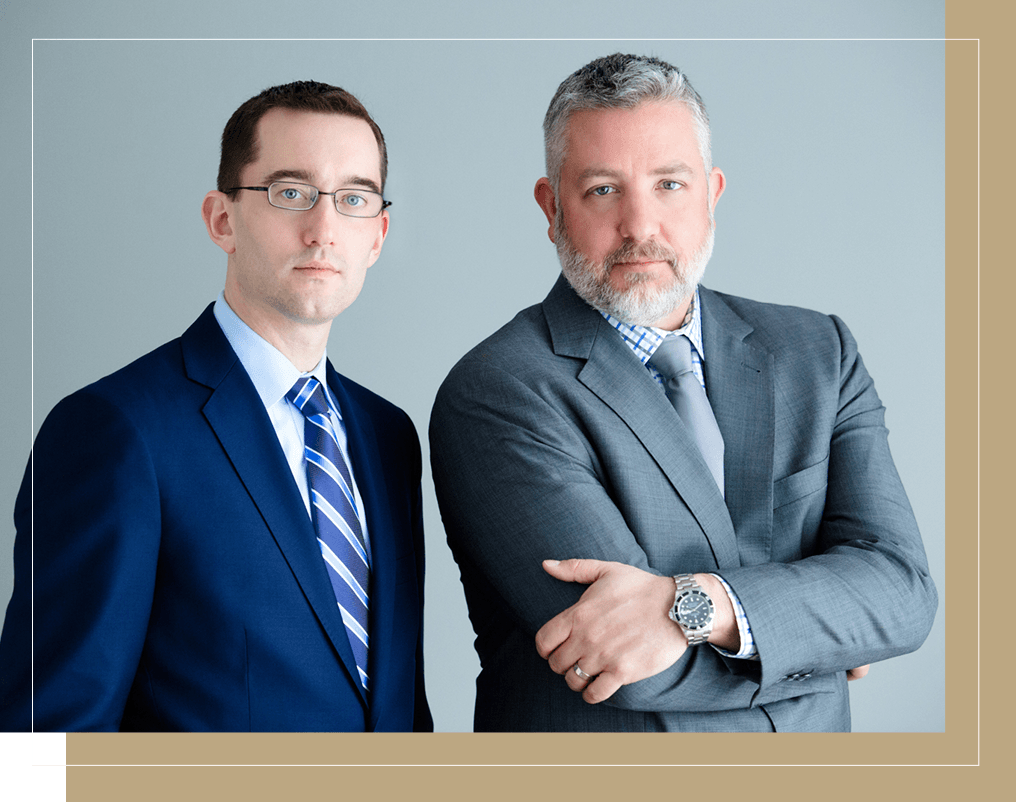
Tax Fraud

Rochester Tax Fraud Attorneys
Defending Clients Facing Tax Fraud Charges in New York
Tax fraud is a serious crime and can lead to severe penalties, including jail time and large fines. If you are facing tax fraud charges, you must speak with an experienced tax fraud attorney as soon as possible. At Nobles & DeCarolis, we have successfully represented hundreds of clients facing tax fraud charges and can help you fight against the allegations against you.
Are you facing tax fraud charges in New York? Call Nobles & Decarolis today at (585) 639-3111 or contact us online to schedule a meeting with one of our tax fraud lawyers in Rochester!
What is Tax Fraud?
Tax fraud is the intentional act of deceiving the government by not reporting taxable income or by claiming false deductions, credits, or exemptions.
Tax fraud can take many forms, including:
- Wire fraud
- Tax evasion
- Fraudulent refunds
- False claims for refunds
- False tax returns
- Filing a false return
What are the Penalties for Tax Fraud in New York?
Tax fraud in New York can result in both civil and criminal penalties. The severity of the penalties depends on the specific type of tax fraud committed, the amount of money involved, and the individual's criminal history.
Criminal Penalties for Tax Fraud
Tax fraud is a felony offense, and criminal penalties can include:
- Imprisonment – A conviction for tax fraud could result in a prison sentence of up to 5 years for each count of tax fraud. Federal charges, in particular, may carry longer sentences, particularly if the fraud involves a significant amount of money or if it is part of a larger conspiracy.
- Fines – Individuals convicted of tax fraud may be subject to substantial fines. The Internal Revenue Service (IRS) can impose penalties of up to 75% of the underpaid taxes. Additionally, state penalties in New York may result in fines of up to $50,000 for individuals and even higher for businesses involved in tax fraud.
- Restitution – In some cases, the court may order the defendant to pay restitution, which is the repayment of the taxes owed, in addition to any fines or penalties imposed.
Civil Penalties for Tax Fraud
In addition to criminal charges, the IRS and New York State Department of Taxation and Finance can impose civil penalties for tax fraud, even if you are not convicted of a crime.
Civil penalties include:
- Interest on unpaid taxes – The IRS and New York State can charge interest on any unpaid taxes, which can accumulate quickly over time.
- Additional Penalties – In some cases, taxpayers may be assessed additional penalties, such as penalties for late filing or for making fraudulent claims for deductions or credits.
- Civil Fraud Penalty – If the IRS or state authorities find that fraud was involved, they may assess a civil fraud penalty, which can be up to 75% of the underpaid taxes.
Defenses Against Tax Fraud Charges
If you have been charged with tax fraud, you do not have to face the charges alone. A skilled Rochester tax fraud attorney can mount a defense to challenge the evidence and protect your interests.
Several potential defenses may apply depending on the facts of your case, including:
- Lack of Intent: If the tax mistake was unintentional or the result of confusion or misunderstanding, it may be possible to avoid conviction.
- Inaccurate or Incomplete Evidence: Often, the government’s case against you may rely on circumstantial evidence or incomplete information. Our Rochester tax fraud lawyer can investigate the evidence and look for inconsistencies or errors that could weaken the prosecution’s case.
- Reliance on a Tax Professional: If you can demonstrate that you acted in good faith and relied on professional advice, it may be possible to avoid criminal liability, especially if the tax professional made an error or misinterpreted the law.
- Failure to File Due to Circumstances Beyond Your Control: If you failed to file your taxes due to extenuating circumstances, such as a medical emergency, financial hardship, or other serious issues, it may be possible to argue that you did not have the ability to file on time and should not be criminally liable for failure to file.
- Entrapment: If you were coerced into filing fraudulent tax returns or making false statements, an entrapment defense may apply.
The Importance of Early Legal Intervention in Tax Fraud Cases
Facing tax fraud allegations can be a daunting experience, but early legal intervention can make a significant difference in the outcome of your case. Engaging a skilled attorney from Nobles & DeCarolis at the first sign of trouble allows for a proactive approach to defending your rights and preserving your financial future.
Here’s why early intervention is crucial:
- Thorough Investigation: An early start enables our attorneys to conduct a comprehensive review of your financial records and the allegations against you, which can lead to evidence that supports your defense.
- Strategic Defense Planning: With ample time to strategize, we can develop a tailored defense that considers all aspects of your case, potentially identifying defenses that may not be apparent at first glance.
- Mitigating Damages: Early legal counsel can help minimize penalties or even prevent charges from being filed altogether, preserving your reputation and finances.
- Guidance Through the Legal Process: Our experienced attorneys will guide you through every step of the legal process, ensuring that you understand your rights and options, which can reduce stress and uncertainty.
Don't wait until it's too late. If you suspect that you may be facing tax fraud issues, contact our dedicated team at Nobles & DeCarolis as soon as possible. We are committed to standing by your side and fighting for the best possible outcome.
Commonly Asked Questions
What is the Statute of Limitations on Tax Fraud in NY?
In New York, the statute of limitations for tax fraud is typically 6 years from the date the fraud occurred. This means the state generally has 6 years to charge someone with tax fraud. However, if the tax fraud involves willful evasion or concealment of taxable income, the statute of limitations may be extended. At the federal level, the IRS also has 6 years to pursue charges for tax fraud, but there is no statute of limitations if the fraud involves intentionally hiding income or assets.
How Long Do You Go to Jail for Fraud in NY?
The potential jail sentence for tax fraud in New York depends on whether the offense is charged as a felony or misdemeanor. If convicted of tax fraud under New York state law, individuals could face up to 5 years in prison, depending on the severity of the case and the amount of tax evasion involved. The exact sentence can vary depending on factors such as the amount of tax fraud, prior criminal history, and whether there are aggravating circumstances in the case.
How Can a Tax Fraud Attorney Help?
A tax fraud attorney can provide legal representation and guidance if you are facing accusations of tax fraud. We can help protect your rights and interests, negotiate with the government, and develop a defense strategy tailored to your specific case. With their knowledge and experience in tax law, they can work to minimize your penalties or even get your charges dropped.
As former federal prosecutors, we have the skills and experience necessary to handle complex tax fraud cases. Our firm is dedicated to providing personalized attention to each of our clients, and we will work tirelessly to help you get the best possible outcome in your case.
Why Choose Nobles & DeCarolis for Your Rochester Tax Fraud Defense?
Facing tax fraud charges can be an overwhelming and daunting experience. At Nobles & DeCarolis, we understand the complexities of tax law and the stress our clients endure during these challenging times. Our dedicated team of experienced attorneys in Rochester is committed to providing personalized legal solutions tailored to your unique circumstances.
Here’s what sets us apart:
- Expertise in Tax Law: Our attorneys possess extensive knowledge and experience in tax law, ensuring that you receive the highest level of representation.
- Individualized Attention: We take the time to understand your specific situation and build a defense strategy that aligns with your goals.
- Proven Track Record: We have successfully defended numerous clients against tax fraud charges, achieving favorable outcomes and protecting their rights.
- Transparent Communication: We believe in open communication throughout the legal process, keeping you informed and involved every step of the way.
Choosing the right representation can make a significant difference in the outcome of your case. Let Nobles & DeCarolis stand by your side and fight for your rights with compassion and tenacity.
Contact Our Rochester Tax Fraud Lawyers Today
If you are facing tax fraud charges, you must speak with an experienced tax fraud attorney as soon as possible. At Nobles & DeCarolis, we have successfully represented hundreds of clients facing tax fraud charges and can help you fight against the allegations against you.
Contact Nobles & DeCarolis today to schedule a FREE consultation with one of our tax fraud attorneys in Rochester! Call now - (585) 639-3111
Case Victories
Tirelessly Advocating For Our Clients
-
Not Guilty Criminal Possession of a Weapon 2nd Degree & Kidnapping 2nd Degree
-
Case Dismissed Possession 2nd & Sale of Marijuana 1st
-
Case Dismissed Manslaughter 1st Degree
-
Not Guilty Robbery 1st & 2nd, Kidnapping 2nd, & Assault 2nd
-
Not Guilty DWI
-
Case Dismissed Rape 1st Degree

James Nobles & Brian DeCarolis
Attorney ProfilesWe Will Get You Through This
See How We've Helped Others
-
“Thoughtful, prepared, thorough and patient, outlining specifics on what could happen.” - Anonymous (AVVO)
-
“HIGHLY recommend him to anyone who needs a lawyer who cares about his clients and is dedicated to getting successful results.” - Brandi (AVVO)


